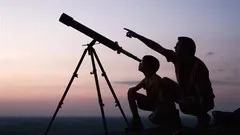
How to REALLY use a Telescope 
Get a comprehesive understanding of How to REALLY use a Telescope. This is a pay course from Udemy. AZ Class provides this course data for free. Learn more certificate and details here. Discover the wonders of the universe with the course "How to REALLY use a Telescope." This comprehensive guide will help you choose the perfect telescope for you and your family, considering factors such as cost, portability, and the objects you want to observe. Learn valuable tips and tricks for assembling and using your telescope effectively, and explore fascinating examples of what celestial objects like Mercury, Venus, the Moon, Mars, Jupiter, and Saturn look like through a beginner telescope. Bonus lessons on astronomy, eclipses, meteor showers, and auroras make this course a must-click for any aspiring stargazer. ▼
ADVERTISEMENT
Course Feature
![]() Cost:
Cost:
Paid
![]() Provider:
Provider:
Udemy
![]() Certificate:
Certificate:
Paid Certification
![]() Language:
Language:
English
![]() Start Date:
Start Date:
2021-11-07
Course Overview
❗The content presented here is sourced directly from Udemy platform. For comprehensive course details, including enrollment information, simply click on the 'Go to class' link on our website.
Updated in [October 07th, 2023]
What does this course tell?
(Please note that the following overview content is from the original platform)
How to REALLY use a Telescope will help you choose the right telescope for you and your family Factors discussed include cost portability the object you want to observe and price range The course includes tips on choosing assembling and using your telescope in a realistic and concrete way We also discuss and show examples of what objects like Mercury Venus the Moon Mars Jupiter and Saturn look like through a beginner telescope Included are observation tips and interesting facts about the objects youll observeWe also discuss larger telescopes in use by professional astronomers both land-based and orbitalThis Course includes great BONUS LESSONS:What on Earth is Astronomy?Mini-Lesson: EclipsesMini-Lesson: Meteor ShowersMini-Lesson: AuroraHow to REALLY Use a Telescope1 Objective & Warm-up activity2 Tips and tricks to finding and tracking objects in the sky3 How to pick the right telescope for your family4 How much to pay for a telescope5 What to look for in a telescope6 What to expect to see with a telescope7 Galileo and telescopes8 Magnification resolution and clarity9 Gathering light and the telescope's aperture10 Comparing and contrasting reflecting and refracting telescopes11 Telescope accessories and Tripods12 The functions and uses of lenses13 Focal length and eyepieces14 Calculating the telescope's magnification ability15 Where to buy a telescope16 Assembling your telescope and getting help at Star parties17 Tips and tricks for assembling and configuring your telescope18 Using the telescope during the day19 Proper storage of your telescope20 A checklist for your first night out with the telescope21 How to find the planets with your telescope22 Adjusting for the Earth's movement23 Cleaning the telescope24 Using a telescope with young children25 Managing expectations26 Observation tips and interesting facts about the Moon27 Observation tips and interesting facts about Mercury28 Observation tips and interesting facts about Venus29 Observation tips and interesting facts about Mars30 Observation tips and interesting facts about Jupiter31 Observation tips and interesting facts about Saturn32 Using a telescope with glasses33 Keeping your telescope from fogging up34 Using binoculars to look at the sky35 Using your naked eyes to look at the sky36 Recognizing the constellations37 Observing the Sun with a telescope38 Very large telescopes around the world39 Different kinds of light40 Space-based telescopes41 Radio telescopes42 Infrared telescopes43 Ultraviolet telescopes44 X-ray telescopes45 Test questions & Cross-curricular activities
We considered the value of this course from many aspects, and finally summarized it for you from two aspects: skills and knowledge, and the people who benefit from it:
(Please note that our content is optimized through artificial intelligence tools and carefully reviewed by our editorial staff.)
What skills and knowledge will you acquire during this course?
During the course "How to REALLY use a Telescope," learners will acquire the following skills and knowledge:
1. Choosing the right telescope: Learners will understand the factors to consider when selecting a telescope, such as cost, portability, and the specific objects they want to observe.
2. Assembling and using a telescope: The course provides practical tips and guidance on assembling and using a telescope effectively. Learners will gain hands-on knowledge on how to find and track objects in the sky.
3. Understanding what to expect: The course includes examples and discussions on what objects like Mercury, Venus, the Moon, Mars, Jupiter, and Saturn look like through a beginner telescope. Learners will also receive observation tips and interesting facts about these objects.
4. Exploring larger telescopes: The course covers larger telescopes used by professional astronomers, both land-based and orbital. Learners will gain insights into their functions and uses.
5. Bonus lessons: The course includes additional lessons on various astronomy topics, such as eclipses, meteor showers, and auroras.
6. Telescope accessories and maintenance: Learners will understand the different accessories and tripods that can enhance their telescope experience. They will also learn about proper storage, cleaning, and preventing fogging up of the telescope.
7. Alternative sky-watching methods: The course covers using binoculars and naked eyes to observe the sky, recognizing constellations, and observing the Sun with a telescope.
8. Different types of telescopes: Learners will gain knowledge about various types of telescopes, including reflecting and refracting telescopes, as well as space-based telescopes, radio telescopes, infrared telescopes, ultraviolet telescopes, and X-ray telescopes.
9. Cross-curricular activities: The course includes test questions and cross-curricular activities to reinforce learning and provide a comprehensive understanding of telescope usage.
Who will benefit from this course?
This course on "How to REALLY use a Telescope" will benefit individuals who have an interest in astronomy and stargazing. It is particularly useful for beginners who are looking to purchase their first telescope and learn how to use it effectively.
Specific professions that may benefit from this course include:
1. Amateur astronomers: This course provides valuable information on choosing the right telescope, understanding its features, and maximizing its capabilities. It also offers tips and tricks for finding and tracking objects in the sky, as well as observation techniques and interesting facts about various celestial objects.
2. Science educators: Teachers and educators who want to incorporate astronomy into their curriculum can benefit from this course. It covers topics such as the functions and uses of lenses, magnification, and different types of telescopes. The bonus lessons on astronomy-related topics like eclipses, meteor showers, and auroras can also be used as supplementary material for classroom discussions.
3. Parents and families: The course offers guidance on selecting a telescope suitable for family use, considering factors like cost, portability, and the objects they want to observe. It also provides tips for using the telescope with young children and managing expectations. This can be a great resource for families interested in exploring the night sky together.
4. Hobbyists and enthusiasts: Individuals who have a general interest in astronomy and stargazing can benefit from this course to enhance their knowledge and skills. It covers a wide range of topics, including telescope accessories, adjusting for the Earth's movement, recognizing constellations, and using different types of telescopes. The course also provides information on very large telescopes around the world and space-based telescopes, which can be of interest to enthusiasts.
Course Syllabus
Introductory Activities
Main Lesson
Assessment Questions & Answers
Activities
Bonus Lesson: What on Earth is Astronomy
Bonus Lesson: Eclipse
Bonus Mini Lesson - Meteor Showers
Bonus Lesson: Aurora
Course Provider

Provider Udemy's Stats at AZClass
Discussion and Reviews
0.0 (Based on 0 reviews)
Explore Similar Online Courses

New Trends in Outer Space Development

Robotic Space Exploration

Python for Informatics: Exploring Information

Social Network Analysis

Introduction to Systematic Review and Meta-Analysis

The Analytics Edge

DCO042 - Python For Informatics

Causal Diagrams: Draw Your Assumptions Before Your Conclusions

Whole genome sequencing of bacterial genomes - tools and applications

Astronomy: Eclipses Prediction

Astronomy: Exploring the solar system


Start your review of How to REALLY use a Telescope